 Petzlover
Petzlover Peruvian Hairless is originated from Peru but Stephens Stock is originated from United States. Both Peruvian Hairless and Stephens Stock are of same height. Peruvian Hairless may weigh 33 kg / 72 pounds lesser than Stephens Stock. Both Peruvian Hairless and Stephens Stock has almost same life span. Both Peruvian Hairless and Stephens Stock has almost same litter size. Peruvian Hairless requires Moderate Maintenance. But Stephens Stock requires Low Maintenance
Peruvian Hairless is originated from Peru but Stephens Stock is originated from United States. Both Peruvian Hairless and Stephens Stock are of same height. Peruvian Hairless may weigh 33 kg / 72 pounds lesser than Stephens Stock. Both Peruvian Hairless and Stephens Stock has almost same life span. Both Peruvian Hairless and Stephens Stock has almost same litter size. Peruvian Hairless requires Moderate Maintenance. But Stephens Stock requires Low Maintenance
 This is an ancient breed, and he even looks like he comes from ancient times. This particular dog, the Peruvian Hairless, was part of the Inca Empire and it is amazing that depictions of Peruvian hairless dogs have been seen around around 750 A.D.
This is an ancient breed, and he even looks like he comes from ancient times. This particular dog, the Peruvian Hairless, was part of the Inca Empire and it is amazing that depictions of Peruvian hairless dogs have been seen around around 750 A.D.
It is believed the dogs were a meal for many in those ancient times, and that together with the Spanish conquest of Peru resulted in the dog almost being wiped out.
Today the dog is held in esteem in Peru and it is looked upon as the national dog of Peru – an accolade this dog received in 2001. The Federation Cynologique Internationale has accepted this breed and also adopted an official breed standard.
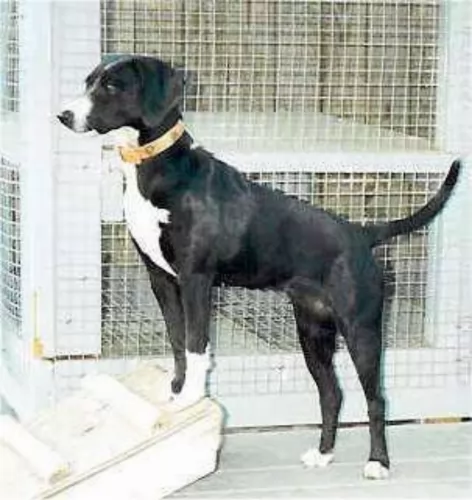 The Stephens Stock is a member if the Cur dog breeds. They are a scent hound bred in southeastern Kentucky by the Stephen’s family. For generations the dogs were simply known as the “little black dog”. The Cur breeds are dogs with a mixture of ancestry and the Stephens Cur is no different. However, the name Cur now means a working dog from the South in the United States. They were known as hunting and guard dogs, chasing wild boar, squirrel and raccoon. They were also called the Mountain Curs throughout Kentucky, Tennessee and Virginia.
The Stephens Stock is a member if the Cur dog breeds. They are a scent hound bred in southeastern Kentucky by the Stephen’s family. For generations the dogs were simply known as the “little black dog”. The Cur breeds are dogs with a mixture of ancestry and the Stephens Cur is no different. However, the name Cur now means a working dog from the South in the United States. They were known as hunting and guard dogs, chasing wild boar, squirrel and raccoon. They were also called the Mountain Curs throughout Kentucky, Tennessee and Virginia.
These mountain working dogs came close to extinction by the 1940’s but four separate breeders set out to save the Mountain Curs. They were the founders of the Mountain Cur Club and involved Woody Huntsman of Kentucky, Carl McConnel of Virginia, Dewey Ledbetter of Virginia and of course Hugh Stephens of Kentucky. Later the name of the club was changed to the Original Mountain Cur Breeders Association or OMCBA. The Mountain View Cur, the Treeing Cur and the Stephens Stock Cur were the results of their efforts.
In the 1970’s Stephen’s decided that his Cur was different from the original Mountain Curs and should be a separate breed. He formed the Stephen’s Breeders Association and the breed was recognized as distinct from other Curs. However, it was not recognized by the UKC (United Kennel Club) until 1998.
 There is no doubt that the most important feature of this dog is its hairlessness, but there is nearly always a little bit of hair on top of its head and on the tip of the tail.
There is no doubt that the most important feature of this dog is its hairlessness, but there is nearly always a little bit of hair on top of its head and on the tip of the tail.
The color of the dog’s skin can be dark brown, mottled or a grey shade. They can be a solid color or grey or brown but with pink spots. The eyes of the dog are brown and the ears can be floppy or erect and the tail is long.
He stands at anything between 25 to 50cm, depending on whether he is a small or medium sized Peruvian. Weights can vary too but can be 4kg for the smaller type, going up to 25 kg for the larger dogs. The dogs are always slim.
Peruvian Hairless dogs love their human families, being somewhat wary around strangers. They are lively, intelligent, alert and protective.
Lean and agile, they can be quick too. Just like with any other dogs, he will require training and socialization if you want him to be obedient and well behaved. He gets on well with other pets in the house and will get on well with disciplined children. This is a quiet dog but even so, he makes a good guard dog.
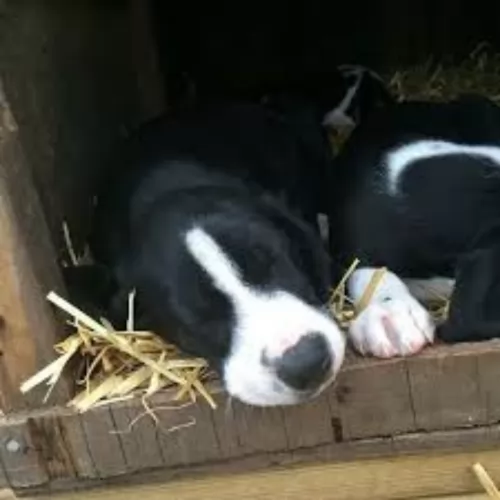 The Stephens Stock Cur is a breed of medium size, dark dogs – either very dark grey or black. Their heads are domed, and the muzzle is short with dark eyes. The breed’s chest is broad and deep with a neck of medium length and either a rough or smooth coat. They are smaller than the other Curs like the Black Mouth Cur or the Mountain View Cur.
The Stephens Stock Cur is a breed of medium size, dark dogs – either very dark grey or black. Their heads are domed, and the muzzle is short with dark eyes. The breed’s chest is broad and deep with a neck of medium length and either a rough or smooth coat. They are smaller than the other Curs like the Black Mouth Cur or the Mountain View Cur.
They are strong and capable of treeing their prey. Their body is longer than it is high, and they have powerful and long legs. Their appearance is sleek and elegant. The nose is dark and square, and their stance is alert and that of a watchdog. This is an athletic hunting dog that is aggressive in the field and chilled at home.
 From ancient times, the Peruvian Hairless has been man’s best friend, and June 12th is the official day of the Peruvian Hairless Dog. These dogs love being surrounded by their human family. They are cheerful, playful, social dogs and they make great playmates for children when the children don’t rough play too much so as to injure him.
From ancient times, the Peruvian Hairless has been man’s best friend, and June 12th is the official day of the Peruvian Hairless Dog. These dogs love being surrounded by their human family. They are cheerful, playful, social dogs and they make great playmates for children when the children don’t rough play too much so as to injure him.
He is also a good watchdog and when he isn’t protecting you or playing he can be calm and quiet, and slot easily into life in the countryside or the city. Treat him well and you'll enjoy excellent friendship from this hairless canine friend.
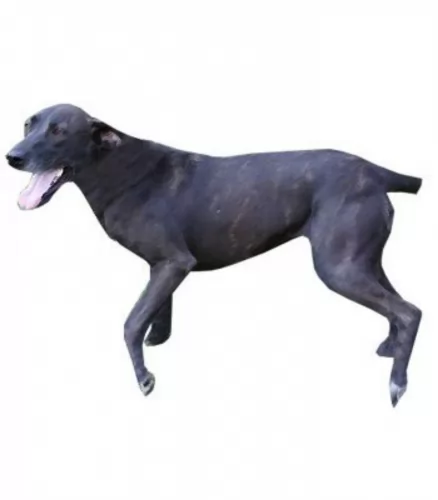 1. Children friendliness - They are tenacious on the hunt but once at home they love children.
1. Children friendliness - They are tenacious on the hunt but once at home they love children.
3.Adaptability They are adaptable if you can get them the exercise, they need every day. They won’t do well in an apartment without going to play and run somewhere else every day.
 Like all breeds there will be some health problems with your Peruvian Hairless, although with good care care this dog can live to be 12 years of age or maybe even a little older. Some things to look out for include -
Like all breeds there will be some health problems with your Peruvian Hairless, although with good care care this dog can live to be 12 years of age or maybe even a little older. Some things to look out for include -
You may notice your dog not eating his food, having an upset stomach and vomiting. Irritable bowel syndrome in a dog is a persistent upset stomach, resulting in diarrhea and bloating. IBS isn’t reserved for older dogs, and it can affect any breed or sex. You’ll notice your pet being listless and without energy. In severe cases of IBS, you may notice blood in your pet’s feces. Don’t allow your canine friend to suffer – get him to the vet.
Also known as epilepsy, it can be disturbing for you to see your canine friend having a seizure. Uncontrolled bursts of electrical activity in your dog’s brain cause these seizures which are a mix of twitching and shaking. The seizure can last for less than a minute or for several minutes. A number of things can cause these seizures in dogs – head injuries, anemia, kidney disease, liver disease, electrolyte problems, brain cancer among others.
Many dogs suffer with one or other skin problems and these can be painful and frustrating. Hairless breeds are more likely to suffer with skin issues and they require special grooming and skin care to prevent dryness, insect bites, sunburn etc.
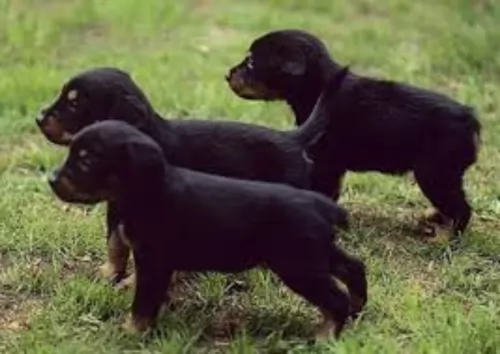 The Stephens Stock Cur is a fairly healthy breed, fairly isolated in the hills and mountains of Kentucky and Tennessee. They are prone to a few health conditions but there are no genetic and breed specific issues.
The Stephens Stock Cur is a fairly healthy breed, fairly isolated in the hills and mountains of Kentucky and Tennessee. They are prone to a few health conditions but there are no genetic and breed specific issues.
• Ear and Eye Infections. Keep them clean and keep debris out of both ears and eyes after hunting.
 For some, the lack of hair is appealing to some people who battle with allergies. The skin of the dog will need to be washed to remove dirt. You’ve got to be careful however, what you wash your dog with because these dogs are known to get blackheads and acne because of blocked pores.
For some, the lack of hair is appealing to some people who battle with allergies. The skin of the dog will need to be washed to remove dirt. You’ve got to be careful however, what you wash your dog with because these dogs are known to get blackheads and acne because of blocked pores.
Then again, the skin can become quite dry, so you need to strike a balance. Talk to a dog expert or your vet on how to care for such a dog’s skin.
You’ll also need to consider your dog when he goes outside into the sun. Protection against sunlight is recommended and once again you might want to find out about sun blocks. Because of the lack of hair, he may also be sensitive to the cold.
Make sure this unusual pet gets the right diet. You want to be sure that whether you feed him commercially manufactured foods or he gets some home-made food it is full of vitamins and minerals. Steer away from spicy, unusual foods as dogs love simplicity and consistency.
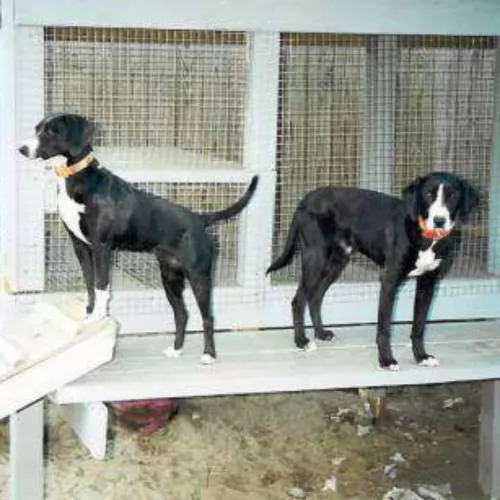 1.Feeding the puppy -Feed puppies a quality food desired for medium breed, high energy dogs. Puppies should eat 3 times a day about a total of 2 cups.
1.Feeding the puppy -Feed puppies a quality food desired for medium breed, high energy dogs. Puppies should eat 3 times a day about a total of 2 cups.
2.Feeding the adult Feed a high quality dog food with plenty of protein and designed for medium size dogs. Feed a total of 3 cups over 2 meals a day.
4. Games and Exercises – This is a very high energy treeing hunting dog with remarkable speed and agility. They need exercise – both physical and mental. One walk a day will not do it for these dogs. Have a fenced in yard or take them to organized activities like field trials, agility, flyball, hunting, search and rescue or barn hunt. They love to hunt with their people.